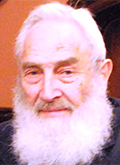Samuel Klausner, Sociology
 Samuel Zundel Klausner, an emeritus professor of sociology in the School of Arts and Sciences, passed away on December 27, 2021. He was 98.
Samuel Zundel Klausner, an emeritus professor of sociology in the School of Arts and Sciences, passed away on December 27, 2021. He was 98.
Dr. Klausner was born in Brooklyn. His father was a structural engineer and his mother was one of the earliest women literary agents. Dr. Klausner interrupted his undergraduate studies at New York University to serve in the United States Army Air Corps during World War II, where he became a decorated war hero; he eventually earned a BS in mathematics in 1947. He was a volunteer air navigator in what became the Israel Air Force from 1947 to 1948. After he returned to the United States, he earned an MA (1950) and EdD (1951) in psychology at Columbia Teacher’s College. He was certified as a clinical psychologist in New York and Washington, D.C. Subsequently, he shifted his academic focus to sociology, earning a PhD in sociology at Columbia University in 1963.
During the 1950s and 1960s, Dr. Klausner conducted research in Israel, at the Bureau of Applied Social Science Research at Columbia, and with the Bureau of Social Science Research in Washington, D.C. In addition, he taught from 1951 to 1963 at the City College of New York, Hebrew University, Columbia, and the Union Theological Seminary. Five years later, he was recruited to Penn’s department of sociology, where he began as an associate professor and was promoted to full professor in 1972. Upon joining Penn, Dr. Klausner immediately dove into campus involvement, co-chairing the Faculty Advisory Committee. He also created and directed the Center for Research on The Acts of Man (which he led until 1988).
In 1971, Dr. Klausner published a book, Man and His Environment, that raised questions of humans’ environmental impact and uniquely (for the time) framed it as a sociological issue. Dr. Klausner continued to research this subject throughout the 1970s, positing that energy usage per capita did not depend on the number of people in a household, but the number of roles (parent, child, etc.) present (Almanac March 6, 1980); he wrote several more books on the topic over the ensuing years. In 1972, he was chosen as the social impact advisor to the San Francisco Bay Area Rapid Transit System. He kept engaging with other areas of sociology during this era; in 1972, he was elected vice president of the Society for the Scientific Study of Religion, and three years later, he was elected president of the Association for the Sociological Study of Jewry. He also participated in the much-publicized Penn-Israel Exchange Project in 1976. During the 1970s, Dr. Klausner served on Penn’s University Council Steering Committee, and later served in a number of positions in the Faculty Senate.
In 1982, Dr. Klausner published Eskimo Capitalists: Oil, Politics, and Alcohol, a book for which he stayed in Point Barrow, a headland on the Arctic coast, for six months at a time, living among the Inuit community. The next year, he won a Fulbright Scholarship to conduct research in Egypt. He still remained involved in Penn life, though. He wrote a “speaking out” piece in Almanac (Almanac September 19, 1989) to urge Penn’s admissions office not to discriminate against highly qualified Asian and Asian American applicants because of quota systems. He used his sociological credentials to weigh in on a proposal to require undergraduates to take classes in “minority history” (Almanac April 19, 1988): “Studying China using European concepts is not the same as adopting a Chinese perspective.” In 1992, Dr. Klausner joined Penn’s Twenty-Five Year Club.
The 1990s saw Dr. Klausner study the experiences of religious converts, mainly from Judaism to Christianity and vice-versa. He retired from Penn and took emeritus status in 1996. He continued to engage (as he had been doing since the 1980s) with several universities in the Middle East as a visiting professor, including the Hebrew University in Jerusalem, where he taught in Hebrew; Al-Mansoura University in Egypt; and Muhammad V University in Rabat, Morocco, where he taught in Arabic. In addition to these languages, Dr. Klausner was also fluent in French, Yiddish, Dutch, Spanish, and Aramaic. In 2005, Dr. Klausner served as the first secretary-treasurer of the newly-formed Penn Association of Senior and Emeritus Faculty. Dr. Klausner published ten books during his lifetime and was working on another at the time of his death.
Dr. Klausner was predeceased by his daughter, Rina. He is survived by his wife, Roberta Sands; his sister, Deborah Reiser; his children, Jonathan, Daphne, and Tamar; two stepchildren, Bonnie Moskoff and Philip Wilhelm; six grandchildren; and three great-grandchildren.
--
To Report A Death
Almanac appreciates being informed of the deaths of current and former faculty and staff members, students and other members of the University community. Call (215) 898-5274 or email almanac@upenn.edu.
However, notices of alumni deaths should be directed to the Alumni Records Office at Suite 300, 2929 Walnut St., Philadelphia, PA, (215) 898-8136 or record@ben.dev.upenn.edu.
